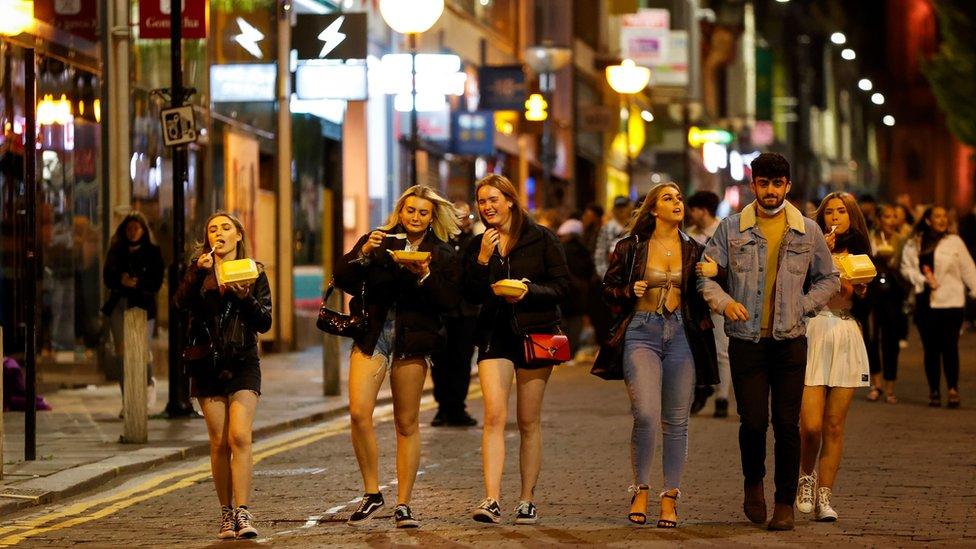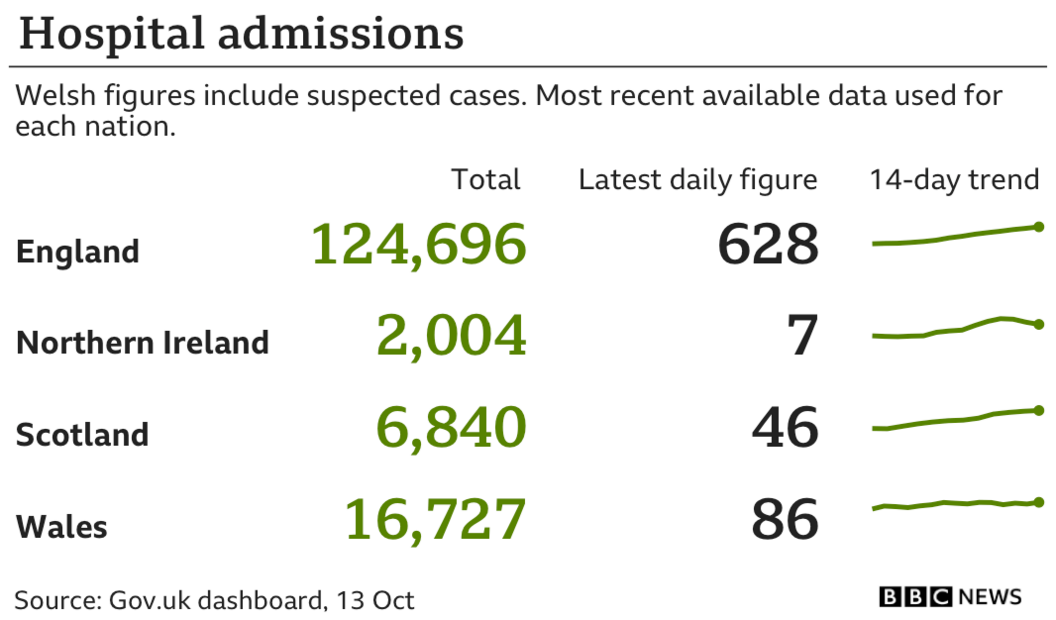Covid-19: New three-tier restrictions come into force in England
- Published

In Liverpool, revellers took to the city centre the night before new restrictions came into force
The new three-tier system of Covid-19 restrictions has begun in England.
Most of the country is in the lowest tier - medium - but millions of people in the North and the Midlands face extra curbs on households mixing.
The Liverpool region is the only area to be under the toughest rules, with pubs and bars not serving meals closed.
Government health officials are due to meet later to discuss the possibility of Greater Manchester, Lancashire and some other areas joining the top tier.
Hours before the top tier rules came into force in Liverpool, police were forced to disperse large crowds in the city.
Meanwhile, Northern Ireland has announced an extension of the half-term holidays for schools, from Monday, alongside other new measures aimed at curbing the spread of the virus.
And in Wales a short circuit breaker lockdown is being "actively considered" by the Welsh Government.
The Labour Mayor of Greater Manchester, Andy Burnham, tweeted, external that he had not spoken with the government about the new restrictions since Friday, claiming pressure was being "piled on via media briefings".
A statement, external from Mr Burnham, his deputy and leaders of all 10 councils in the area, said the current evidence around infection rates and hospital admissions did not support the area going into Tier 3 (the top tier).
The financial package accompanying Tier 3 restrictions was "nowhere near sufficient to prevent severe hardship, widespread job losses and business failure", the statement added.
It comes after Labour leader Sir Keir Starmer called for a two to three-week "circuit-breaker" lockdown in England to bring the infection rate under control.

The new three-tier system sees every area of England classed as being on medium, high or very high alert.
Areas on medium alert are subject to the national restrictions currently in force, including the rule of six on indoor and outdoor gatherings and the 22:00 closing time for pubs, bars and restaurants.
In addition to these restrictions, in areas on high alert - including north-east England, much of the North West and parts of the Midlands, along with West and South Yorkshire - different households are not allowed to mix indoors.
Areas on very high alert face extra curbs, with different households banned from mixing indoors or outdoors in hospitality venues or private gardens.
Pubs and bars will be closed unless they are serving substantial meals and there is also guidance against travelling in and out of the area.
Further restrictions may be agreed for particular regions in the top tier and in the Liverpool City Region gyms, leisure centres, betting shops and casinos will also close.


Prime Minister Boris Johnson defended the system at Prime Minister's Questions, saying the regional approach aimed to "seize this moment now to avoid the misery of a national lockdown".
But Labour's Sir Keir Starmer told the Commons the measures did not go far enough - a view he said was echoed by the government's scientific advisers.
And MPs in Liverpool said the city "risks being dragged back to the 1980s" without proper financial support alongside the new restrictions.
Parliament has approved the legislation to write a new three-tier system into law, but 42 Tory MPs rebelled in a vote to express their disapproval of the 22:00 closing time for pubs and restaurants in England.
Meanwhile, the Scottish government is to implement its own three-tier framework of restrictions later in October. In the meantime, pubs and restaurants in Scotland's central belt, including Edinburgh and Glasgow, were closed on Friday until 25 October as part of a package of short-term measures.
In Northern Ireland, hospitality businesses will only be allowed to offer takeaway and delivery services for four weeks from Friday, alongside a raft of new restrictions.
The country's First Minister, Arlene Foster, said the decisions had not been taken lightly, adding: "I don't shy away from the fact that a lot of these decisions will have huge impacts - we're very determined this will be a time-limited intervention."
And in Wales, the Welsh Government is considering bringing in deeper lockdown measures over a short period of time, including closing pubs and restaurants during the school half-term holiday.


The government sees its three-tier system of localised restrictions as striking a balance between fighting the virus and protecting the economy.
However, Sir Keir Starmer's decision to back a much tougher England-wide temporary lockdown does mean there is now an alternative plan on the table. And it is a plan that came recommended by the government's own scientists.
Downing Street has not ruled out a "circuit break" completely - to do so, it maintains, would be irresponsible. But it has been very clear that it does not want to get there.
A senior government source accused Labour of playing politics but the move will increase the pressure on Mr Johnson to show that his alternative works - and does so quickly.
He is likely to have the backing of his own MPs - many of whom are not keen to go further for now at least. The former minister Andrew Mitchell - who has voiced criticism in recent days - said the three tier system must be given time to show results.

Outlining his call for a "circuit breaker" at a press conference on Tuesday evening, Sir Keir said current measures to curb the spread of coronavirus were not working.
He proposed that schools would remain open, with the circuit breaker taking place across half-term to "minimise disruption".
However he said it would mean all pubs, bars and restaurants would be closed and compensated. Non-essential retail businesses would also shut.


SOCIAL DISTANCING: How have rules on meeting friends changed?
FACE MASKS: When do I need to wear one?
TESTING: How do I get a virus test?

His comments came after documents revealed, external government scientific advisers called for such action three weeks ago.
On Tuesday, a further 17,234 coronavirus cases were recorded in the UK, while 143 more people have died within 28 days of testing positive for the virus.

YOU, ME AND THE BIG C: About Cancer Treatment and Covid-19
LONG COVID: What's the science behind the long term symptoms?

How will the new restrictions affect you? Tell us by emailing haveyoursay@bbc.co.uk, external.
Please include a contact number if you are willing to speak to a BBC journalist. You can also get in touch in the following ways:
WhatsApp: +44 7756 165803, external
Tweet: @BBC_HaveYourSay, external
Or fill out the form below
Please read our terms & conditions and privacy policy
If you are reading this page and can't see the form you will need to visit the mobile version of the BBC website to submit your question or comment or you can email us at HaveYourSay@bbc.co.uk, external. Please include your name, age and location with any submission.